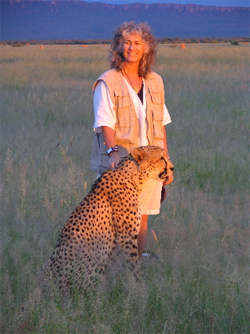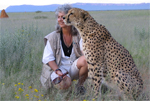Cheetah conservationist awarded for renewable energy product that helps wildlife
mongabay.com
November 14, 2008
|
|
Dr. Laurie Marker, founder and Executive Director of the Cheetah Conservation Fund (CCF), has been awarded $50,000 by the Tech Museum of Innovation for her organization’s Bushblok program which uses a high-pressure extrusion process to convert invasive, habitat-destroying bush into a clean-burning fuel log. Bushblok provides an alternative to products such as firewood, coal, lump charcoal and charcoal briquettes that are costly or result in environmental harm.
“Given the inspiring achievements of the other Tech Laureates, I’m incredibly honored that CCF received this award,” Marker said. “I had thought that a simple fuel log that helps cheetahs and people would be too basic to be recognized by the Tech Museum, but that’s exactly what was so amazing about all the Laureates—their ideas are simple yet revolutionary to the people whose lives they affect.”
 Laurie Marker and Chewbaaka, an orphaned cheetah. Courtesy of CCF |
Marker founded the non-profit Cheetah Conservation Fund (CCF) in 1990 and based its international center in Namibia, the country with the last large remaining wild cheetah population.
Marker says that Namibia is considering using invasive bush as biomass to power electric plants to help energy-dependent Namibia generate its own electricity.
“Clearing invasive bush helps restore millions of acres of Namibian savannah to its original state and improve the habitat for both the cheetah and its prey,” CCF explained in a statement.
Marker and CCF were one of five Tech Museum Laureates in the Intel Environment Award Category and 25 global innovators recognized by the Tech Awards for “applying technology to benefit humanity and spark global change”. Marker was selected from among hundreds of nominations representing 68 countries.
The global population of cheetah remaining in the wild is around 10,000. The species — which is the world fastest land animal — is listed as Vulnerable on the IUCN Red List.
An interview with Dr. Laurie Marker
 |
Viewing the world's fastest land animal as a threat to their livestock, in the 1980s farmers killed half of Namibia's cheetah population. The trend continued into the early 1990s, when the population was diminished again by nearly half, leaving less than 2,500 cheetah in the southern African country. Today cheetah populations have stabilized and are on the rise due to the efforts of the Cheetah Conservation Fund, an organization founded by Dr. Laurie Marker in 1990.